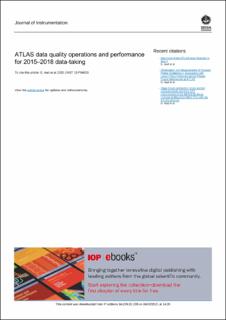ATLAS data quality operations and performance for 2015–2018 data-taking
Aad, Georges; Abbott, Brad; Abbott, Dale C.; Abed Abud, Adam; Abeling, Kira; Abhayasinghe, Deshan Kavishka; Abidi, Syed Haider; AbouZeid, Hass; Abraham, Nadine L.; Abramowicz, Halina; Bjørke, Kristian; Bugge, Magnar Kopangen; Cameron, David Gordon; Catmore, James Richard; Garonne, Vincent; Gramstad, Eirik; Hellesund, Simen; Morisbak, Vanja; Oppen, Henrik; Ould-Saada, Farid; Pedersen, Maiken; Read, Alexander Lincoln; Rye, Eli Bæverfjord; Røhne, Ole Myren; Sandaker, Heidi; Vadla, Knut Oddvar Høie; Buanes, Trygve; Djuvsland, Julia Isabell; Eigen, Gerald; Fomin, Nikolai; Lee, Graham Richard; Lipniacka, Anna; Martin dit Latour, Bertrand; Stugu, Bjarne; Træet, Are Sivertsen; Abreu, Henso; Abulaiti, Yiming; Acharya, Bobby S.; Achkar, Baida; Adachi, Shunsuke; Adam, Lennart; Adam-Bourdarios, Claire; Adamczyk, Leszek; Adamek, Lukas; Adelman, Jareed; Adersberger, Michael; Adigüzel, Aytül; Adorni, Sofia; Adye, Tim; Affolder, Anthony Allen; ATLAS, Collaboration
Journal article, Peer reviewed
Published version

Åpne
Permanent lenke
https://hdl.handle.net/11250/2756142Utgivelsesdato
2020-04Metadata
Vis full innførselSamlinger
Sammendrag
The ATLAS detector at the Large Hadron Collider reads out particle collision data from over 100 million electronic channels at a rate of approximately 100 kHz, with a recording rate for physics events of approximately 1 kHz. Before being certified for physics analysis at computer centres worldwide, the data must be scrutinised to ensure they are clean from any hardware or software related issues that may compromise their integrity. Prompt identification of these issues permits fast action to investigate, correct and potentially prevent future such problems that could render the data unusable. This is achieved through the monitoring of detector-level quantities and reconstructed collision event characteristics at key stages of the data processing chain. This paper presents the monitoring and assessment procedures in place at ATLAS during 2015–2018 data-taking. Through the continuous improvement of operational procedures, ATLAS achieved a high data quality efficiency, with 95.6% of the recorded proton-proton collision data collected at √s=13 TeV certified for physics analysis.
